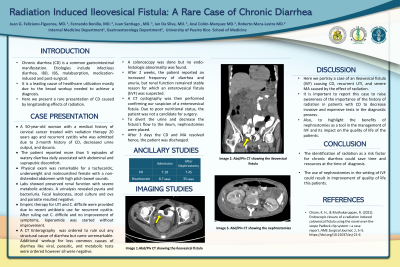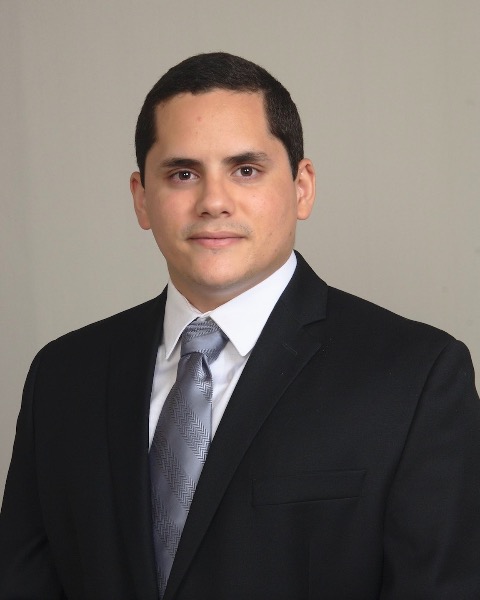Back


Poster Session B - Monday Morning
Category: Small Intestine
B0656 - Radiation-Induced Ileovesical Fistula: A Rare Presentation of Chronic Diarrhea
Monday, October 24, 2022
10:00 AM – 12:00 PM ET
Location: Crown Ballroom

Has Audio

Juan G. Feliciano-Figueroa, MD
University of Puerto Rico School of Medicine
San Juan, PR
Presenting Author(s)
Juan G. Feliciano-Figueroa, MD1, Fernando Bonilla-Valentin, MD2, Roberto Mera-Lastra, MD2, Jose Colon, MD3, Ian Da Silva, MD2
1University of Puerto Rico School of Medicine, San Juan, Puerto Rico; 2University of Puerto Rico, San Juan, Puerto Rico; 3University of Puerto Rico, Internal Medicine Program, San Juan, Puerto Rico
Introduction: Chronic diarrhea (CD) is a common gastrointestinal manifestation. Etiologies include infectious diarrhea, IBD, IBS, malabsorption, medication-induced and post-surgical. It is a leading cause of healthcare utilization mostly due to the broad workup needed to achieve a diagnosis. Here we present a rare presentation of CD caused by longstanding effects of radiation.
Case Description/Methods: This is a case of a 50-year-old woman with a history of cervical cancer treated with radiation therapy 20 years ago and recurrent cystitis who was admitted due to 2 month history of CD, decreased urine output, and dysuria. The patient reported more than 5 episodes of watery diarrhea daily associated with abdominal and suprapubic discomfort. Vital signs were remarkable for tachycardia. On physical exam, she was found underweight and malnourished with a non-distended abdomen with high pitch bowel sounds. Labs showed preserved renal function with metabolic acidosis(MA). A urinalysis revealed pyuria and bacteriuria. Fecal leukocytes, stool culture and ova and parasite resulted negative. Empiric therapy for UTI and C. difficile were provided due to recent antibiotic use for recurrent cystitis. After ruling out C. difficile and no improvement of symptoms, loperamide was started without improvement. A CTE was ordered to rule out any structural cause of diarrhea but came unremarkable. Additional workup for less common causes of diarrhea like viral, parasitic and metabolic tests were ordered but all were negative. A colonoscopy was done but no endo-histologic abnormality was found. After 2 weeks, the patient reported an increased frequency of diarrhea and anuria, but renal function remained stable reason for which an enterovesical fistula (EVF) was suspected. A CT cystography was then performed confirming our suspicion. Due to poor nutritional status, the patient was not a candidate for surgery. To divert the urine and decrease the fistula’s flow to the ileum, nephrostomies were placed. After 3 days the CD and MA resolved hence, the patient was discharged.
Discussion: Here we portray a case of an Ileovesical fistula (IVF) causing CD, recurrent UTI, and severe MA caused by the effect of radiation. It is important to report this case to raise awareness of the importance of the history of radiation in patients with CD to decrease invasive and expensive tests in the diagnostic process. Also, to highlight the benefits of nephrostomies as a tool in the management of IVF and its impact on the quality of life of the patients.

Disclosures:
Juan G. Feliciano-Figueroa, MD1, Fernando Bonilla-Valentin, MD2, Roberto Mera-Lastra, MD2, Jose Colon, MD3, Ian Da Silva, MD2. B0656 - Radiation-Induced Ileovesical Fistula: A Rare Presentation of Chronic Diarrhea, ACG 2022 Annual Scientific Meeting Abstracts. Charlotte, NC: American College of Gastroenterology.
1University of Puerto Rico School of Medicine, San Juan, Puerto Rico; 2University of Puerto Rico, San Juan, Puerto Rico; 3University of Puerto Rico, Internal Medicine Program, San Juan, Puerto Rico
Introduction: Chronic diarrhea (CD) is a common gastrointestinal manifestation. Etiologies include infectious diarrhea, IBD, IBS, malabsorption, medication-induced and post-surgical. It is a leading cause of healthcare utilization mostly due to the broad workup needed to achieve a diagnosis. Here we present a rare presentation of CD caused by longstanding effects of radiation.
Case Description/Methods: This is a case of a 50-year-old woman with a history of cervical cancer treated with radiation therapy 20 years ago and recurrent cystitis who was admitted due to 2 month history of CD, decreased urine output, and dysuria. The patient reported more than 5 episodes of watery diarrhea daily associated with abdominal and suprapubic discomfort. Vital signs were remarkable for tachycardia. On physical exam, she was found underweight and malnourished with a non-distended abdomen with high pitch bowel sounds. Labs showed preserved renal function with metabolic acidosis(MA). A urinalysis revealed pyuria and bacteriuria. Fecal leukocytes, stool culture and ova and parasite resulted negative. Empiric therapy for UTI and C. difficile were provided due to recent antibiotic use for recurrent cystitis. After ruling out C. difficile and no improvement of symptoms, loperamide was started without improvement. A CTE was ordered to rule out any structural cause of diarrhea but came unremarkable. Additional workup for less common causes of diarrhea like viral, parasitic and metabolic tests were ordered but all were negative. A colonoscopy was done but no endo-histologic abnormality was found. After 2 weeks, the patient reported an increased frequency of diarrhea and anuria, but renal function remained stable reason for which an enterovesical fistula (EVF) was suspected. A CT cystography was then performed confirming our suspicion. Due to poor nutritional status, the patient was not a candidate for surgery. To divert the urine and decrease the fistula’s flow to the ileum, nephrostomies were placed. After 3 days the CD and MA resolved hence, the patient was discharged.
Discussion: Here we portray a case of an Ileovesical fistula (IVF) causing CD, recurrent UTI, and severe MA caused by the effect of radiation. It is important to report this case to raise awareness of the importance of the history of radiation in patients with CD to decrease invasive and expensive tests in the diagnostic process. Also, to highlight the benefits of nephrostomies as a tool in the management of IVF and its impact on the quality of life of the patients.
Disclosures:
Juan Feliciano-Figueroa indicated no relevant financial relationships.
Fernando Bonilla-Valentin indicated no relevant financial relationships.
Roberto Mera-Lastra indicated no relevant financial relationships.
Jose Colon indicated no relevant financial relationships.
Ian Da Silva indicated no relevant financial relationships.
Juan G. Feliciano-Figueroa, MD1, Fernando Bonilla-Valentin, MD2, Roberto Mera-Lastra, MD2, Jose Colon, MD3, Ian Da Silva, MD2. B0656 - Radiation-Induced Ileovesical Fistula: A Rare Presentation of Chronic Diarrhea, ACG 2022 Annual Scientific Meeting Abstracts. Charlotte, NC: American College of Gastroenterology.
